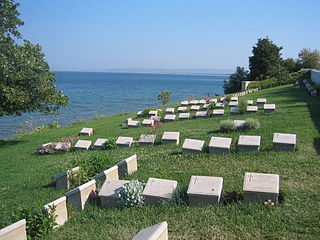
The Commonwealth War Graves Commission (CWGC) is an intergovernmental organisation of six independent member states whose principal function is to mark, record and maintain the graves and places of commemoration of Commonwealth of Nations military service members who died in the two World Wars. The commission is also responsible for commemorating Commonwealth civilians who died as a result of enemy action during the Second World War. The commission was founded by Sir Fabian Ware and constituted through Royal Charter in 1917 as the Imperial War Graves Commission. The change to the present name took place in 1960.

The Battle of Chunuk Bair was a World War I battle fought between the Ottoman defenders and troops of the British Empire over control of the peak in August 1915. The capture of Chunuk Bair,, the secondary peak of the Sari Bair range, was one of the two objectives of the Battle of Sari Bair.
Twelve Tree Copse Cemetery is a Commonwealth War Graves Commission cemetery containing the remains of Allied troops who died during the Gallipoli campaign. It is located about one kilometre (0.62 mi) south-west of Krithia on the Gallipoli Peninsula.

Beach Cemetery is a small Commonwealth War Graves Commission cemetery containing the remains of allied troops who died during the Battle of Gallipoli. It is located at Hell Spit, at the southern end of Anzac Cove on the Gallipoli Peninsula.

Quinn's Post Cemetery is a Commonwealth War Graves Commission cemetery from World War I in the former Anzac sector of the Gallipoli Peninsula, Turkey. The battles at Gallipoli, some of whose participating soldiers are buried at this cemetery, were an eight-month campaign fought by Commonwealth and French forces against Turkish forces in an attempt to force Turkey out of the war, to relieve the deadlock of the Western Front (France/Belgium) and to open a supply route to Russia through the Dardanelles and the Black Sea.
Hill 10 Cemetery is a Commonwealth War Graves Commission Cemetery in the former Suvla Bay sector of the Gallipoli Peninsula, Turkey. The battles at Gallipoli, some of whose participating soldiers are buried at this cemetery, was an eight-month campaign fought by Commonwealth and French forces against Turkish forces in an attempt to force Turkey out of the war, to relieve the deadlock of the Western Front (France/Belgium) and to open a supply route to Russia through the Dardanelles and the Black Sea.
Canterbury Cemetery is a small Commonwealth War Graves Commission cemetery located at ANZAC Cove in Turkey. It contains the remains of 27 soldiers from the New Zealand Expeditionary Force. 26 were from the Canterbury Mounted Rifles and one from the Wellington Regiment. It is the only CWGC cemetery on the Gallipoli peninsula which has no epitaphs on any of the grave markers.

Plugge's Plateau Cemetery is the smallest Commonwealth War Graves Commission cemetery on the Gallipoli Peninsula in Turkey. It contains some of soldiers killed during World War I during the battles at Gallipoli, was an eight-month campaign fought by Commonwealth and French forces against Turkish forces in an attempt to force Turkey out of the war, to relieve the deadlock of the Western Front (France/Belgium) and to open a supply route to Russia through the Dardanelles and the Black Sea.

Hill 60 Cemetery is a Commonwealth War Graves Commission cemetery dating from World War I at the Northern end of the former Anzac sector of the Gallipoli Peninsula, Turkey and the location of Hill 60 Memorial, one of four memorials on the peninsula which commemorate New Zealanders killed in the campaign but who have no known grave.

Johnston's Jolly Cemetery is a Commonwealth War Graves Commission cemetery containing the remains of some of the Allied troops who died during the Battle of Gallipoli.

Courtney's and Steel's Post Cemetery is a Commonwealth War Graves Commission cemetery located near ANZAC Cove on the Gallipoli peninsula in Turkey. It contains the graves of some of the former British Empire troops who died during the Gallipoli Campaign.
Lala Baba Cemetery is a Commonwealth War Graves Commission cemetery on the Gallipoli Peninsula in Turkey. It contains the remains of some of the soldiers killed during World War I during the battles at Gallipoli. This was an eight-month campaign fought by Commonwealth and French forces against Ottoman Empire forces to try to force the Ottoman Empire out of the war which it was hoped would open a supply route from the Mediterranean to Russia through the Dardanelles and Istanbul and to relieve the deadlock on the Western Front.

Lone Pine Cemetery is a Commonwealth War Graves Commission cemetery dating from World War I in the former Anzac sector of the Gallipoli Peninsula, Turkey and the location of the Lone Pine Memorial, one of five memorials on the peninsula which commemorate servicemen of the former British Empire killed in the campaign but who have no known grave.

The Bayeux War Cemetery is the largest Second World War cemetery of Commonwealth soldiers in France, located in Bayeux, Normandy. The cemetery contains 4,648 burials, mostly of the Invasion of Normandy. Opposite this cemetery stands the Bayeux Memorial which commemorates more than 1,800 casualties of the Commonwealth forces who died in Normandy and have no known grave.

Karori Cemetery is New Zealand's second largest cemetery, located in the Wellington suburb of Karori.

Major Norman Frederick Hastings, DSO served as Officer Commanding New Zealand's 6th (Manawatu) Squadron, Wellington Mounted Rifles Regiment. After serving with British military units during the Second Anglo-Boer War in South Africa, he worked as an engineering fitter with the New Zealand Railways Department workshops at Petone. He enlisted in the New Zealand Expeditionary Force at the outbreak of World War I, and served with distinction before dying of wounds after the attack on Chunuk Bair, Gallipoli, in August 1915. He was awarded the Distinguished Service Order, was Mentioned in Despatches, and was one of only 14 members of the New Zealand Army to receive the French Legion of Honour decoration during the war. The memorial flagstaff at Petone railway station appears to have been erected in his honour, and was the site of New Zealand's first public Anzac Day ceremony on 25 April 1916.

The Helles Memorial is a Commonwealth War Graves Commission war memorial near Sedd el Bahr, in Turkey, on the headland at the tip of the Gallipoli peninsula overlooking the Dardanelles. It includes an obelisk which is over 30 metres (98 ft) high.

The battle for No.3 Post was fought during the Gallipoli Campaign in the First World War, between the forces of the New Zealand Mounted Rifles Brigade and the Turkish 19th Division.

The Gallipoli Peninsula Historical Site covers over 33,000 hectares in Gallipoli, Turkey. The park was established in 1973 by the Turkish government and is included in the United Nations list of National Parks and Protected Areas. Gallipoli Peninsula Historical Site is home to memorials, graveyards, and commemorations of events that took place on the peninsula since the First World War.















